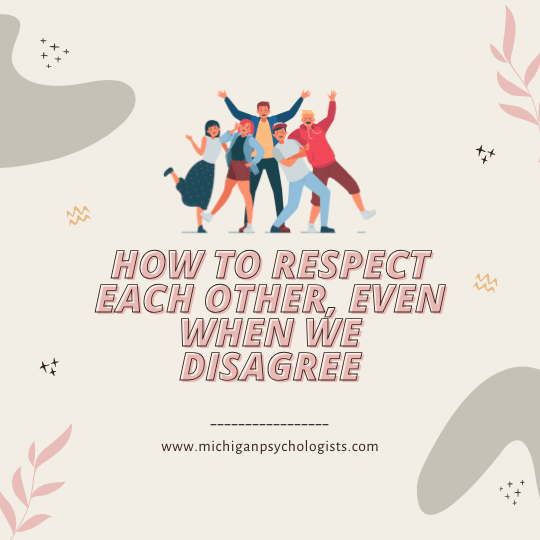How to Respect Each Other, Even When We Disagree

Table of Contents
Respecting each other in the face of disagreement is one of the greatest challenges of our time. Whether it’s politics, religion, or the best pizza topping, disagreements are inevitable. But respect? That’s optional, and unfortunately, often overlooked. Here’s how we can navigate this tricky terrain with some insights and humor, in true Scott Adams style.
The Mechanisms Behind Disrespect
First, let’s understand why we tend to disrespect those who disagree with us. There are several psychological and social mechanisms at play:
Cognitive Dissonance: When someone disagrees with us, it creates a clash in our minds. We hold a belief or value, and the other person’s opposing view feels like an attack. Our brains don’t like this discomfort, so we might respond with defensiveness or disdain.
Tribalism: Humans are wired to belong to groups. When someone from an “opposing tribe” disagrees, it feels like a threat to our identity. This tribal mentality makes it easy to dehumanize and disrespect those who don’t share our views.
Ego Protection: Admitting that someone else might be right can be a blow to our egos. To protect our sense of self-worth, we might belittle or dismiss the other person instead.
Key Steps to Overcoming Disrespect
Now that we’ve identified the culprits, let’s tackle them head-on. Here are practical steps to ensure respect, even amidst disagreement:
Recognize Cognitive Dissonance: When you feel that uncomfortable clash, acknowledge it. Instead of reacting defensively, take a moment to understand why you feel threatened. This awareness can help you respond more calmly and respectfully.
Embrace Curiosity: Shift from a mindset of defending your position to one of curiosity. Ask questions. Understand why the other person holds their view. This doesn’t mean you have to agree, but it shows respect for their perspective.
Separate the Person from the Idea: Remember that disagreeing with someone’s idea doesn’t mean you dislike them as a person. Focus on the argument, not the individual. This helps maintain respect even when opinions differ.
Practice Empathy: Try to see things from the other person’s perspective. Empathy is a powerful tool for building respect. When you understand where someone is coming from, it’s harder to dismiss or disrespect them.
Mind Your Language: Words have power. Avoid using inflammatory or derogatory language when discussing disagreements. Respectful language fosters a constructive dialogue and shows that you value the other person.
Admit When You’re Wrong: This is a tough one, but crucial. Admitting when you’re wrong isn’t a sign of weakness; it’s a sign of strength and integrity. It also models respectful behavior and encourages others to do the same.
Set Boundaries: Sometimes, agreeing to disagree is the best course of action. Set boundaries to avoid escalating conflict. It’s okay to step back from a conversation if it’s becoming too heated.
Focus on Common Ground: Highlight areas where you do agree. This builds rapport and reminds both parties that you’re not entirely opposed. Finding common ground can ease tensions and promote mutual respect.
Lead by Example: Demonstrate respect in your interactions, especially in disagreements. Others are more likely to mirror your behavior. Respect breeds respect.
Humor: Don’t underestimate the power of a well-placed joke. Humor can diffuse
tension and remind us not to take ourselves too seriously. A light-hearted approach can make disagreements feel less confrontational and more like a friendly exchange of ideas.
The Power of Respect
Respect isn’t just a feel-good concept; it’s a practical strategy for navigating disagreements. When we respect each other, even in the face of differing opinions, we create a more harmonious and productive environment. Here’s why it works:
- Builds Trust: Respectful interactions build trust. When people feel respected, they’re more likely to engage openly and honestly.
- Enhances Collaboration: Teams that respect each other, despite differences, are more effective. They can leverage diverse viewpoints to find innovative solutions.
- Reduces Conflict: Respect minimizes the likelihood of conflicts escalating. Disagreements can be handled more constructively, preventing unnecessary drama.
- Promotes Growth: Respectful disagreements can be a source of learning. They challenge us to think critically and expand our perspectives.
Disagreements are inevitable, but disrespect doesn’t have to be. By understanding the psychological mechanisms that lead to disrespect and implementing strategies to overcome them, we can foster a culture of respect and understanding. Whether it’s a heated debate or a casual conversation, let’s commit to respecting each other, even when we disagree. After all, respect is the foundation of any meaningful connection.
Remember, the goal isn’t to agree on everything. The goal is to create a space where different ideas can coexist, where we can challenge each other and grow, all while maintaining mutual respect. So the next time you find yourself in a disagreement, take a deep breath, embrace curiosity, and choose respect. It’s not just a nicer way to live; it’s a smarter way to engage.